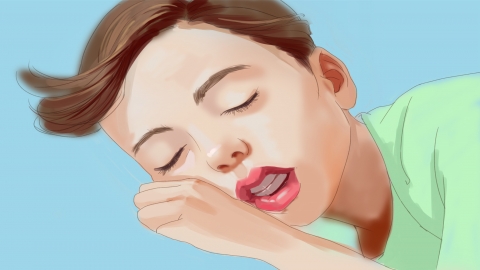What causes drooling during sleep?
Saliva leakage during sleep may be caused by poor oral hygiene, improper sleeping posture, dietary irritation, periodontitis, gastroesophageal reflux disease (GERD), and other factors. Appropriate management can be selected based on specific circumstances. If physical discomfort occurs, it is recommended to seek medical attention promptly and follow medical advice for treatment.

1. Poor oral hygiene: Inadequate oral cleaning and food residue can lead to bacterial growth, which stimulates saliva secretion. Brushing teeth in the morning and evening, rinsing the mouth after meals, and using dental floss to clean between teeth are recommended.
2. Improper sleeping posture: Sleeping on the stomach or on one's side can compress the parotid gland, leading to saliva leakage. This situation usually does not accompany other symptoms, with a damp pillow noticed only upon waking. Adjusting to a supine sleeping position can reduce pressure on the parotid gland.
3. Dietary irritation: Consuming spicy or acidic foods before bedtime may stimulate the salivary glands, causing drooling. Avoiding such foods 2-3 hours before sleep and maintaining a light diet can help prevent saliva leakage during sleep.
4. Periodontitis: Long-term accumulation of dental plaque and calculus can cause inflammation, stimulating saliva secretion and resulting in drooling during sleep. Symptoms such as red and swollen gums and bleeding may also be present. Patients can follow medical advice to use medications such as metronidazole buccal tablets, diboron ointment for brushing teeth, and compound chlorhexidine mouthwash to alleviate symptoms.
5. Gastroesophageal reflux disease: This condition is usually caused by relaxation of the lower esophageal sphincter, leading to gastric acid reflux that irritates the mouth and causes drooling. It may also be accompanied by symptoms such as heartburn and acid regurgitation. Patients can take medications like omeprazole enteric-coated capsules, domperidone tablets, and hydrotalcite chewable tablets under medical guidance to relieve discomfort.
Maintaining good sleep hygiene habits, such as going to bed at a consistent time and avoiding electronic devices before bedtime, can help improve sleep quality.
References:
[1] Xu Liang. Why Do I Frequently Drool While Sleeping? [J]. Chinese Medicine Health Preservation, 2018, 4(07): 58.
[2] Xu Rui. Is Drooling During Sleep Truly a Sign of Sound Sleep? [J]. Shanxi Elderly, 2023, (12): 61.
[3] Li Peijun. What Should Adults Do If They Still Drool During Sleep? [J]. Health Guide, 2016, 22(02): 56.







